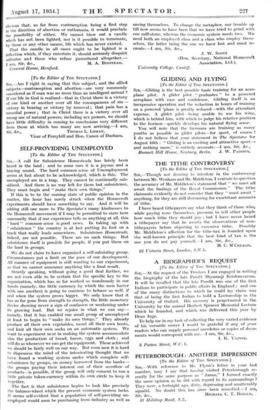SELF-PROVIDING UNEMPLOYED
[To the Editor of THE SPECTATOR.] SIR,—A call for Subsistence Homesteads has lately been heard in the land ; and to some ears it is a joyous and a bracing sound. The hard common sense of Unemployment seems at last about to be acknowledged, which is this. The unemployed are in a trap. They cannot be continually sub- sidized. And there is no way left for them but subsistence. They must begin and "make their own things."
If this is to be the coming state of public opinion in the matter, the hour has surely struck when the Homecroft experiments should have something to say. And it will be adding still one more to The Spectator's many kindnesses to the Homecroft movement if I may be permitted to state here summarily that if our experience tells us anything at all, this " hard " common sense is good news. In taking up with " subsistence " the country is at last putting its foot on a track that really leads somewhere. Subsistence Homesteads, indeed, are not possible. There are no such things. But subsistence itself is possible for people, if you put them on the land in groups.
We do not claim to have organized a self-subsisting group. Circumstances put a limit on the pace of our development. All manner of equipment is still wanting to our experiment, so that we cannot announce anything like a final result.
Strictly speaking, without going a good deal further, we are not even able to be certain that the specific key to the organization, which has so far worked so wondrously in our hands (namely, the little currency by which the men barter with one another) is going to continue to behave so well, if and when the system grows bigger. We only know that it has so far gone from strength to strength, the little monetary device showing never a sign of confusion or weakening under its growing load. But we rejoice in what we can say— namely, that it has enabled one small group of unemployed at least to begin to "make its own things." They already produce all their own vegetables, mend all their own boots, and knit all their own socks on an automatic system. We want to experiment next in making the system accommodate also the production of bread, bacon, eggs and cloth ; and will do so whenever we can get the equipment. These achieved we should be fairly well on our way. But even now it is hard to dispossess the mind of the intoxicating thought that we have found a working system under which complete self- subsistence by groups, on money borrowed from the banks— the groups paying their interest out of their overflow of products--is possible, if the group will only consent to run a little private token-currency within its own circle to keep it together.
The fact is that subsistence begins to look like precisely the balance-wheel which the present economic system lacks. It seems self-evident that a population of self-providing un- employed would soon be purchasing from industry as well as
saving themselves. To change the metaphor, our trouble up till now seems to have been that we have tried to grind with one mill-stone, whereas the economic system needs two. We need both an employed class and a class who employ them- selves, the latter being the one we have lost and must re- create.—I am, Sir, &e.,
J. W. Scorr (Hon. Secretary, National Homecroft Association, Ltd.).
University College, Cardiff.


































 Previous page
Previous page